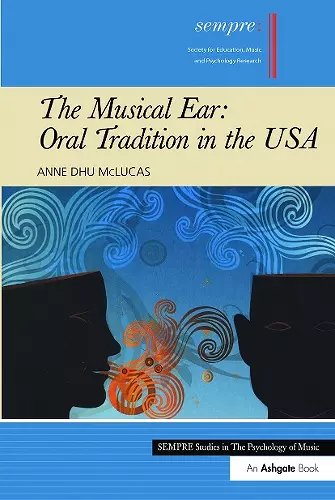The Musical Ear: Oral Tradition in the USA
Format:Paperback
Publisher:Taylor & Francis Ltd
Published:18th Jul '11
Currently unavailable, our supplier has not provided us a restock date

The Musical Ear: Oral Tradition in the USA provides a wide-ranging look at the role played by music that is passed on orally without the use of notation, in the folk, popular and art musics of North America. Professor McLucas argues that without the broad underlying oral repertoire of folk music, many musical styles - from that of the eighteenth-century singing schools to the minstrel tunes of Foster, the orchestral music of Copland and the jazz compositions of Armstrong and Ellington - would not possess their distinctive rhythmic and melodic content. Without the strong processes of oral tradition - its ability to communicate effectively to a particular ethnic or social group - American popular music would be much less multi-dimensional and vital. And without the idea that every man and woman has a voice and is entitled to sing (or play), the more elitist view of European music might be stronger than the participatory model appropriate to a democracy. Found within the many oral traditions of the United States are common elements that apply to all human cultures. These elements are connected with the human mind, the limits of memory, the power of organization and the urge toward creativity. In order to study the process and to find the common elements, McLucas provides an overview of recent research on the brain and memory in order to help the reader understand the inner workings of oral tradition. This book is in part a reaction to recent comprehensive histories of American music that focus on written art and popular music and do not do justice to either the prevalence of oral tradition or to its pervasive influence on American music. It is this imbalance that the book redresses. Includes an accompanying CD.
Award: Shortlisted for the Katharine Briggs Award 2010 'In The Musical Ear Professor McLucas follows scholars like Albert Lord, John Blacking, and Christopher Small in the project of validating orally-transmitted "folk" and "popular" musical traditions in contrast to the "classical" traditions of Western art music transmitted in written notation. She goes beyond her predecessors first in addressing the impact of recorded sound on musical transmission, second in attempting to base her arguments on psychological and neurological research into musical memory and musical creation. It is an ambitious undertaking that sheds light not just on oral vs. written traditions but on human aptitudes, capacities and need for music in general.' John Spitzer, San Francisco Conservatory of Music, USA 'This book contains a magisterial compilation of all the ways in which non-notated (and in many cases non-notatable) activities lie at the heart of American music, past and present. It is enlivened by case studies and interviews with living musicians, and also by an ambitious juxtaposition of historical musicology, ethnomusicology, and psychology. ' John Sloboda, University of Keele, UK and Royal Holloway, University of London, UK ’Anne Dhu McLucas taps into a vast repertoire to illustrate the profound impact of the unwritten ... The accompanying CD enhances the reading of passages on both melody and neurons... academics won’t be the only ones harvesting titles from the glorious bibliography.’ 4 stars, Songlines '[McLucas] has produced an excellent introduction to this topic, which will be of great value to those studying all varieties of American music and those interested in the psychology of music.' Notes 'This book opens readers' eyes to the realization that oral traditions played (and still play) a vital role in American music's development, performance, and continuance.' Journal of Historical Research in Music Education 'This is a pioneering effort, one that in decad
ISBN: 9781409432906
Dimensions: unknown
Weight: 453g
218 pages